Global Freight Transportation Management Market Size Set to Reach USD 34.52 Billion by 2030, Driven by Digitalization and Supply Chain Optimization
Market Estimation, Growth Drivers, and Opportunities
The global Freight Transportation Management Market is projected to grow from USD 19.87 billion in 2023 to USD 34.52 billion by 2030, registering a CAGR of 8.2%. This growth is fueled by increasing globalization, rising e-commerce demand, and advancements in digital technologies such as artificial intelligence (AI), big data analytics, and the Internet of Things (IoT).
Key factors contributing to market expansion include:
-
Supply Chain Digitalization: The adoption of digital solutions for real-time tracking, predictive analytics, and route optimization is enhancing operational efficiency.
-
Rising E-commerce Growth: The surge in online shopping is driving demand for efficient freight transportation management systems, ensuring timely and cost-effective deliveries.
-
Government Regulations and Sustainability Initiatives: Policies promoting green logistics and emission reduction are encouraging companies to invest in eco-friendly transportation solutions.
-
Technological Advancements: AI-powered fleet management systems and blockchain-based logistics solutions are transforming the industry, enhancing security and transparency.
Opportunities within the market lie in smart logistics solutions, AI-driven transportation optimization, and automation of freight operations, which are expected to revolutionize supply chain efficiency.
Discover In-Depth Insights: Get Your Free Sample of Our Latest Report Today @https://www.maximizemarketresearch.com/request-sample/164213/
U.S. Market Trends and Investments
In 2024, the U.S. freight transportation management market has witnessed significant developments, including increased investments in technology-driven logistics solutions. The ongoing shift toward electric and autonomous freight vehicles is gaining traction, with companies like Tesla and Nikola expanding their electric truck production. Additionally, the rise of AI-powered route optimization and smart warehousing solutions is improving last-mile delivery efficiency. The Biden administration's infrastructure plan, which allocates billions of dollars to modernizing the nation’s transportation network, has further accelerated investments in freight management solutions.
Market Segmentation: Leading Segment
The road freight transportation segment holds the largest market share, accounting for over 60% of the global freight transportation management market. This dominance is due to:
-
The extensive road networks facilitating domestic and cross-border trade.
-
The rise of e-commerce increasing demand for trucking and last-mile delivery services.
-
The adoption of telematics and AI-based fleet management solutions improving operational efficiency.
Competitive Analysis
The top five companies dominating the global freight transportation management market include:
-
SAP SE – A global leader in enterprise software solutions, SAP SE has introduced AI-driven supply chain management tools, helping businesses optimize freight operations and reduce costs.
-
Oracle Corporation – Oracle's transportation management solutions leverage cloud-based analytics, enhancing real-time shipment tracking and route optimization. The company recently invested in AI-based predictive analytics to enhance supply chain visibility.
-
Manhattan Associates – Known for its innovative logistics solutions, Manhattan Associates has integrated blockchain technology into its freight management system, boosting security and transparency across supply chains.
-
C.H. Robinson Worldwide Inc. – A key player in logistics and freight brokerage, C.H. Robinson has expanded its digital freight matching platform, reducing inefficiencies and improving carrier utilization.
-
Trimble Inc. – A leader in transportation technology, Trimble has launched AI-powered fleet management solutions that improve fuel efficiency, automate compliance tracking, and enhance driver safety.
These companies continue to invest in cutting-edge technology, sustainability initiatives, and AI-driven automation to enhance operational efficiency and maintain a competitive edge in the market.
To Gain More Insights into the Market Analysis, Browse Summary of the Research Report:https://www.maximizemarketresearch.com/market-report/freight-transportation-management-market/164213/
Regional Analysis
-
United States: The U.S. accounts for nearly 35% of the global market share, driven by government infrastructure investments, a growing e-commerce sector, and advancements in AI-based logistics solutions. Federal initiatives promoting sustainability in freight transportation have accelerated the adoption of electric and autonomous trucking.
-
United Kingdom: The UK's freight market is expanding, supported by post-Brexit trade adjustments, increased demand for warehouse automation, and government incentives for eco-friendly freight transportation.
-
Germany: As Europe’s logistics hub, Germany's strong manufacturing sector and investments in smart logistics solutions have propelled market growth. Government policies favoring digitalization in logistics and AI-driven automation further strengthen the industry.
-
France: The French government’s emphasis on sustainable transportation, including increased funding for rail and multimodal freight solutions, has contributed to market growth. Investments in AI-powered logistics optimization are enhancing supply chain efficiency.
-
Japan: Japan’s freight management market is driven by advanced automation in logistics, high-speed rail freight infrastructure, and government policies promoting AI and IoT integration in supply chain management.
-
China: The world's largest manufacturing hub, China’s freight transportation sector is expanding rapidly. Government-backed infrastructure projects, investment in smart logistics, and the growth of cross-border e-commerce are fueling market expansion.
Conclusion
The global Freight Transportation Management Market is poised for strong growth, with digital transformation, sustainability initiatives, and AI-driven logistics optimization driving the industry forward. Companies that embrace AI, automation, and eco-friendly freight solutions will gain a competitive edge in the evolving logistics landscape. The adoption of blockchain for transparency, the expansion of electric and autonomous trucking, and the increasing demand for smart logistics platforms are expected to be the primary growth drivers in the coming years.
